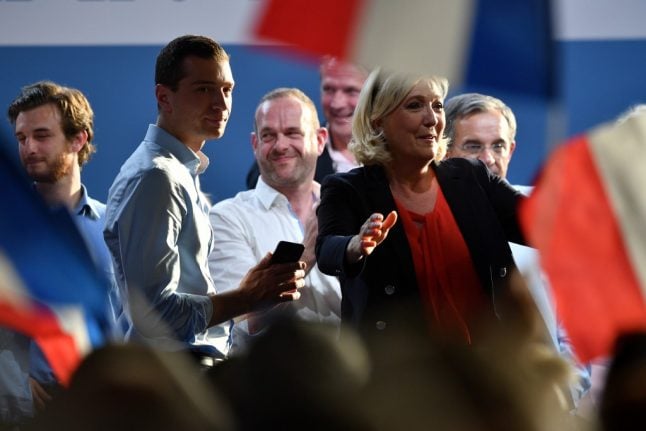Results released on Monday morning by the Ministry of the Interior, which have yet to be formally verified and declared by the National Voting Commission, showed that the far right Rassemblement National (RN) party topped the polls with 23.3 percent of the vote, beating French president Emmanuel Macron's La Republique En Marche.
They were closely followed by Macron's party, which polled 22.4 percent.

Emmanuel and Brigitte Macron at a polling station in Le Touquet earlier on Sunday. Photo: AFP
The allocation of seats in the European Parliament has been complicated for France by the UK's delayed departure from the EU.
The Parliament had already decided that after Brexit, some of the seats that had been occupied by British MEPs would be reallocated to other countries, with France set to gain an extra five seats
However, last minute delays to Brexit meant that the UK had to take part in the elections, with the result that France will not gain its extra seats until Britain leaves the EU.
On last night's polling results, the RN will get 22 seats in the European parliament immediately, and an extra seat once Britain leaves.
Macron's LREM will get 21 seats now and 23 after the UK leaves.
The green party lead by Yannick Jadot was placed third with 13.4 percent of the vote, gaining 12 seats now and 13 after Brexit.
The two parties that between them had dominated French politics for decades until the rise of Macron both polled in single figures. Nicolas Sarkozy's old party Les Republicains polled 8.4 percent, while the Socialist party of Francois Hollande was on 6.31 percent, winning them eight and six seats respectively.
Meanwhile the 'yellow vest' candidates scored just 0.54 percent of the vote, below the Animalist party which polled 2.17 percent.

Nathalie Loiseau with LREM party workers. Photo: AFP
Although a total of 34 parties fielded candidates in the European elections in France, the election had largely been framed as a contest between Macron and Le Pen.
Macron's La Republique En Marche party, its list headed by former Europe Minister Nathalie Loiseau, was contesting its first European elections.
Marine Le Pen, on the other hand, was hoping to replicate her 2014 European election victory with her Rassemblement National party, its list headed by a political novice, the 23-year-old Jordan Bardella. Bardella called the results a “failure” for the LREM ruling party and sought to portray Macron's defeat as a rejection by voters of his pro-business agenda in France and pro-EU vision.
Macron had made no secret of the significance he attached to the results, telling regional French newspapers last week that the EU elections were the most important for four decades as the union faced an “existential threat”.

Jordan Bardella, head of the RN list. Photo: AFP
He has jumped into the campaign himself in recent weeks, appearing alone on an election poster in a move that analysts saw as exposing him personally if LREM underperformed.
The score of the National Rally is slightly below the level of 2014 when it won 24.9 percent, again finishing top.
Le Pen had placed herself towards the bottom of the RN list, so she will be returning to the European Parliament, where she served as an MEP from 2004 to 2017.
Turnout at the polls in France was the highest in recent years, with 50.12 percent of people voting, significantly up from 35.07 percent in 2014.
Cue hysteria about a Le Pen victory in next Pres elections in 2022. Nonsense. She did even better in 2014 Euro Elections and was crushed in 2017. Same will happen next time – unless a plausible centre-right or centre-left challenger to Macron emerges. No sign of that tonight.
— John Lichfield (@john_lichfield) May 26, 2019
Veteran France reporter John Lichfield said: “After six months of 'yellow vest' rebellion, that Macron list has 22 percent is respectable. Much better than President Hollande did in 2014 (14.5 percent).
“But he made the election all about himself and lost. His hopes of emerging as de facto EU leader or enacting more French reforms are damaged.”




 Please whitelist us to continue reading.
Please whitelist us to continue reading.
Member comments